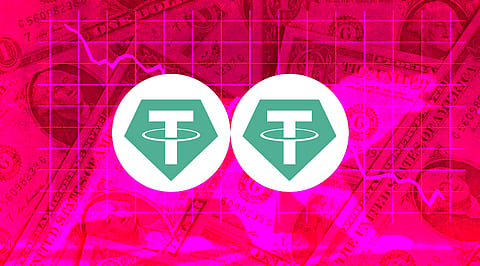

Tether, the world's largest stablecoin, broke below its $1 peg Thursday amid panic in the crypto market. The token sank to as low as 95 cents on some exchanges at around 3:15 a.m. ET. It's meant to be pegged 1-to-1 to the U.S. dollar. In the afternoon it traded at $0.998, according to Coin Metrics. Tether's initial decline came after terraUSD, another stablecoin, plummeted below 30 cents Wednesday, which led to fears of possible market contagion. TerraUSD, or USD is different from the tether in that it relies on code rather than funds held in a reserve to support its supposed peg to the greenback.
Vijay Ayyar, head of international at crypto exchange Luno, said in an interview that the move by tether was likely "speculation-driven fear" resulting from the fallout of UST's plunge. Nicolas Bonnet, crypto operations manager at French broker Apollo also shared his opinion to the reporters that some traders were exploiting the drop in tether through arbitrage plays by essentially buying the token for less than $1 and then redeeming it for a dollar. Stablecoins are kind of like the bank accounts of the crypto world, designed to serve as a sound store of value investors can turn to in times of market volatility. Tether and USDC, the two biggest stablecoins, are meant to be backed by a sufficient amount of money held in a reserve to ensure depositors can receive their dollars when they want to make a withdrawal.
But there have been concerns about whether tether actually has enough assets to back up its intended $1 peg. Tether, the company of the same name, previously said all its tokens were backed 1-to-1 by dollars held in a reserve. However, after a settlement with the New York attorney general, it was revealed that Tether relied on a range of other assets including commercial paper, a form of short-term, unsecured debt, to back its token. Tether has since reduced the amount of commercial paper in its reserves and says it plans to lower its holdings further over time. Earlier Thursday, Tether Chief Technology Officer Paolo Arduino insisted tether holders would always receive $1 when redeeming their tokens. Around 300 million tether tokens were withdrawn in the last 24 hours "without a sweat drop," he tweeted.
Capital Union, a Bahamas-based bank that reportedly holds a portion of reserves by the Tether (USDT) stablecoin issuer, has been actively involved in the cryptocurrency industry. Capital Union's latest crypto-related remarks follow a Monday report claiming that Tether held some of its reserves at the Capital Union bank. The company's representative declined to confirm or deny the bank's involvement in Tether's operations in interviews. The only publicly available information from the bank is included in Capital Union's annual reports, the person added. Founded in 2013, Capital Union managed $1 billion of assets by the end of 2020. The bank partnered with Chainalysis in April 2022 to ensure the safe and compliant rollout of its crypto solutions like trading and custody. According to the bank's spokesperson, the Bahamas was one of the first nations to adopt a regulatory framework known as the DARE Act in 2020. "As a locally regulated bank, this allows us to offer crypto-related services to our clients, which are financial institutions, financial intermediaries, and professional investors," Capital Union's representative said in an interview.
Join our WhatsApp Channel to get the latest news, exclusives and videos on WhatsApp
_____________
Disclaimer: Analytics Insight does not provide financial advice or guidance. Also note that the cryptocurrencies mentioned/listed on the website could potentially be scams, i.e. designed to induce you to invest financial resources that may be lost forever and not be recoverable once investments are made. You are responsible for conducting your own research (DYOR) before making any investments. Read more here.
